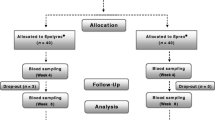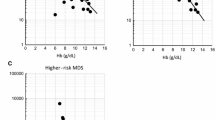Abstract.
Patients with malignant diseases frequently develop anemia. An alternative to blood transfusions is the application of recombinant human erythropoietin. Several nonrandomized and prospective, placebo-controlled studies have demonstrated the effect and safety of erythropoietin in patients with hematological malignancies, particularly in patients with multiple myeloma and low- to intermediate-grade non-Hodgkin's lymphoma. However, in patients with myelodysplastic syndromes, the rather low response rate of erythropoietin is overcome by the combination of erythropoietin with granulocyte colony-stimulating factor. A significant acceleration of the reconstitution of erythropoiesis has been reported in allogeneic, but not in autologous bone marrow transplantation. Especially in large open-label, multicenter studies, a statistically and clinically significant improvement in quality of life independent from chemotherapeutic response or tumor type has been demonstrated. A number of simple algorithms have been proposed using the pretreatment serum erythropoietin level, transfusion requirements, and early changes in hematological parameters.
Similar content being viewed by others
Author information
Authors and Affiliations
Additional information
Electronic Publication
Rights and permissions
About this article
Cite this article
Kasper, .C. Recombinant human erythropoietin in the treatment of anemic patients with hematological malignancies. Ann Hematol 80, 319–329 (2001). https://doi.org/10.1007/s002770100333
Received:
Accepted:
Issue Date:
DOI: https://doi.org/10.1007/s002770100333




